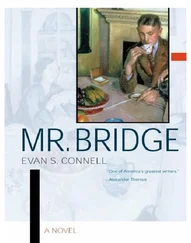“Still married?”
“Of course!” Mrs. Bridge laughed in displeasure. She noticed that Duchesne seemed rather disappointed.
“Why should you ask, Jay?”
“No reason,” he said, flipping the cigarette in the street. “I think about her a lot, that’s all. Tell her hello for me.”
“I certainly will. It’s been nice seeing you again, Jay. You’re looking quite well.”
“Things could be worse, Mrs. B. In the hospital I couldn’t go for it, but I know better now.” He took a deep breath and straightened up. “So, anyhow,” he added, just before walking away, “do give her the word.”
116. Remembrance of Things Past
Her album provided many comforting hours. There she could find her children once again, and her husband, too. He was standing in bright sunshine with one hand on the fender of the new Reo and Carolyn was sitting on his shoulders. There was Douglas showing off the baseball bat they had given him for his birthday. And there was Ruth in her first high heels, standing pigeon-toed and earnestly determined not to fall on her face. There, too, were her friends Grace Barron waving from the high diving board at the country-club pool, Mabel Ong outside the Auxiliary clubhouse with hands thrust in the side pockets of her tweed jacket, Madge one snowy day in a Persian lamb coat with her galoshes unzipped, and Lois Montgomery looking presidential. Mrs. Bridge wished she had taken more snapshot^.
She had quite a few of the European trip. She had spent more than one enjoyable morning with a damp sponge on which to wet the mounting corners, the huge album lying open on the writing desk and the carpet all around her feet littered with negatives and with yellow drugstore envelopes. In went Trafalgar Square, Buckingham Palace, Piccadilly, the Thames, the changing of the Guard, and the ravens she had seen at the Tower of London. In went the Seine, the Arch of Triumph, an awning of Maxim’s, Notre Dame, and Mr. Bridge buying the Herald Tribune in front of the American Express. The pictures of the Riviera had not turned out well, though she could not imagine why, unless the light meter had not been working properly; the Riviera, whenever she thought about it, seemed so foreign, really more foreign to her way of life than Paris had been. Often she remembered the cliffs, the harbor, and the shining sea.
“I don’t know whether this would interest you or not,” she would say to guests, picking up the album in both hands, and as she deposited it on her visitor’s lap she would say, “Now, just look at them until you get bored, but for heaven’s sake don’t feel obliged to go through them all.” And she would then hover nearby, anxious to know which pictures were being looked at. Often she would be unable to sit still; she had to look over the visitor’s shoulder, reaching down now and then to say, “That’s the famous old cathedral you’re always hearing about,” Or, “That’s the ocean, of course.” Or, “This was taken from the steps of the National Gallery, and right there directly behind the man on the bicycle is where we ate lunch.”
But the pictures to which she returned most often for her own pleasure were those of her family: they evoked what she had known most intimately, and all she had loved most profoundly.
One December morning near the end of the year when snow was falling moist and heavy for miles all around, so that the earth and the sky were indivisible, Mrs. Bridge emerged from her home and spread her umbrella. With small cautious steps she proceeded to the garage, where she pressed the button and waited impatiently for the door to lift. She was in a hurry to drive downtown to buy some Irish lace anti-macassars that were advertised in the newspaper, and she was planning to spend the remainder of the day browsing through the stores because it was Harriet’s day off and the house was empty so empty.
She had backed just halfway out of the garage when the engine died. She touched the starter and listened without concern because, despite her difficulties with the Lincoln, she had grown to feel secure in it. The Lincoln was a number of years old and occasionally recalcitrant, but she could not bear the thought of parting with it, and in the past had resisted this suggestion of her husband, who, mildly puzzled by her attachment to the car, had allowed her to keep it.
Thinking she might have flooded the engine, which was often true, Mrs. Bridge decided to wait a minute or so.
Presently she tried again, and again, and then again. Deeply disappointed, she opened the door to get out and discovered she had stopped in such a position that the car doors were prevented from opening more than a few inches on one side by the garage partition, and on the other side by the wall. Having tried all four doors she began to understand that until she could attract someone’s attention she was trapped. She pressed the horn, but there was not a sound. Half inside and half outside she remained.
For a long time she sat there with her gloved hands folded in her lap, not knowing what to do. Once she looked at herself in the mirror. Finally she took the keys from the igni-tion and began tapping on the window, and she called to anyone who might be listening, “Hello? Hello out there?”
But no one answered, unless it was the falling snow.












